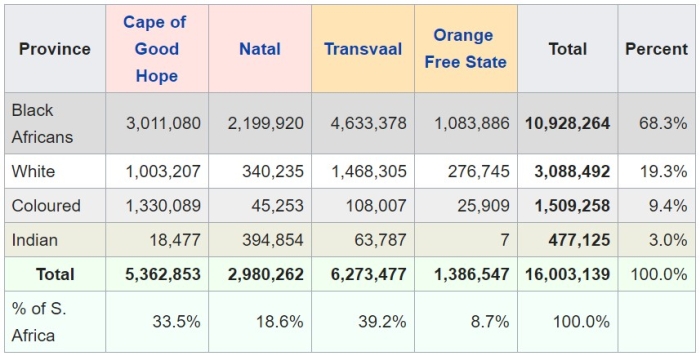SUNDAY, 2 DECEMBER 2018
What happens when you become aware of exactly how much it matters how you think of yourself and the life you lead, and to what degree you create your own reality – both positive and negative, and you then not only apply these beliefs to efforts to improve your own life by, for example, making more money, but you also apply it to one of your other great interests, namely political history?
* * *
By 1960, seventy percent of the population of South Africa was black, about ten percent brown and Indian, and about twenty percent white. Black people, as well as coloured people and people of Indian descent, were deeply aware of the fact that they enjoyed fewer rights than the white population, and that they did not have similar opportunities as their white compatriots. Various campaigns were launched to put pressure on the government to rectify the situation.
Why did many of these efforts largely fail in those decades? Mainstream history books explain that the white government had access to better weapons, and better tools to suppress the black population, and the coloured and Indian populations, and to keep their aspirations under control.
I think another factor also played a role. I believe a critical percentage of adult black, brown and Indian populations fell for the confidence trick of white supremacy. It can even be said that they were trapped in a prison in which they themselves were the main players.
Again, one can quote Marcus Garvey who wrote: “Liberate the minds of men and ultimately you will liberate the bodies of men. […] We are going to emancipate ourselves from mental slavery, for though others may free the body, none but ourselves can free the mind.”
* * *
“Are you saying they were responsible for their own misery?” anyone who polices what people think and say to make sure it doesn’t violate the precepts of the prevailing dogma of our time may ask.
I just write down what is in my mind, I’ll reply. Other people can make their own conclusions according to their own beliefs.
* * *
Do people who would criticise me for this train of thought imply that black, coloured and Indian people in the fifties and sixties and seventies were not capable of creating more positive, more fulfilling lives? Were people like Nelson Mandela, Walter Sisulu and Oliver Tambo not evidence that it was possible? After all, they did not internalise the trick of white supremacy. That was why they were considered dangerous, and why the white government considered it so important to inhibit their movement and prescribe what they said to whom! Specifically, these three men, as well as many other black, coloured, and Indian men and women, confirmed that you are able to create your own reality, in which you can succeed despite opposition.
“But one of the three men you mentioned ended in exile, and the other two in prison for decades,” my opponent in such a debate would remind me.
It is true, I will respond, that what other people decide has an effect on your ability to steer your life in a particular direction. Mandela, Sisulu and Tambo ended up in exile or in prison because not enough other people thought like them. That they were not initially successful – or that it appeared as if they had failed for three decades, was not a rejection of the idea that you are able to create your own well-being and happiness. It simply proved that it matters if not enough people believe it. Not to mention what happens when a significant segment of the population believes that resources are limited, giving their support to a government that oppresses other segments of the population so that this group can get more for themselves.
The history of South Africa is a history of negative beliefs and negative perceptions about self, about other people, and about life, which inevitably leads to negative repercussions.
1960 Census
______________________
